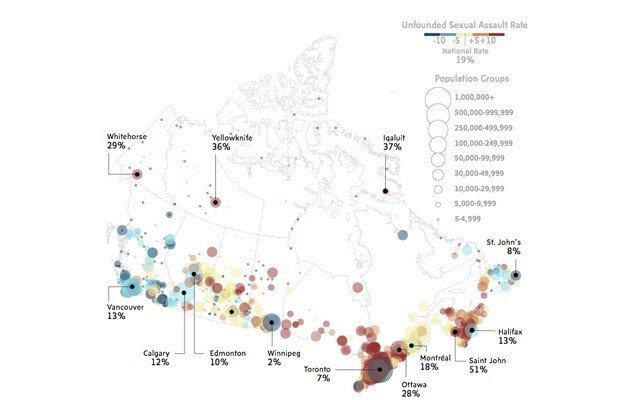One in four sexual assaults reported to Whistler RCMP from 2010 to 2014 were dismissed as unfounded, according to a 20-month-long investigation by the Globe and Mail that looked at how Canadian police forces handle allegations of sexual violence.
The most comprehensive review of its kind in North America, the Feb. 3 article gathered data from 873 police jurisdictions and found that more than 5,000 allegations of sexual assault are closed as unfounded by Canadian law enforcement every year.
In Whistler, the data showed that over the five-year span, 25 of 102 allegations — or 25 per cent — were deemed unfounded by police, higher than the national average of 19 per cent. The results were skewed by Whistler's Olympic year, 2010, when 13 of 23 sexual-assault allegations were dismissed as baseless.
R. Const. Steve LeClair said he reviewed over 70 of the sex-assault files during the same period, and found a pattern in the reports that often led to an unfounded classification.
"Typically, it was somebody other than the victim reporting the assault, and then when the police approached the victim, the victim said there was no assault," he noted. "If cases are legitimately unfounded, I think it's a situation where we have to take every report and investigate it thoroughly."
According to the Globe, the findings exposed "deep flaws" at every step of the investigative process across Canada: inadequate police training; dated interviewing techniques that don't account for the effect trauma can have on memory; and rape myths among law-enforcement officials.
LeClair "respectfully disagrees" with that assertion, and said he's confident in the training local police receive. Last week, 11 local RCMP members attended a conference held in Whistler that looked at the impact of trauma on victims of violence.
The Globe report also noted "vast discrepancies" in unfounded rates between jurisdictions, regardless of size and demographics, which suggests that complainants of sex assault "in some parts of the country are far less likely to be believed than in other parts." Locally, Whistler's unfounded rate was higher than neighbouring Pemberton (18 per cent) and Squamish (nine per cent).
"I think good leadership on this issue is key to seeing that policies and procedures are standardized from detachment to detachment so there isn't this big discrepancy we're seeing in the corridor," said Shannon Herdman, sexual assault prevention and response coordinator for the Howe Sound Women's Centre.
She also acknowledged that, as a transient town, Whistler comes with some "distinct dynamics" that can present a barrier to police, something LeClair echoed.
"The problem is we have victims and witnesses that aren't local, so if you have somebody from halfway across the world that is a victim in a sex assault, it makes prosecution more problematic," he said.
Herdman, who said clients have reported both positive and negative interactions with local police following reports of sexual assault, believes "local leadership is motivated to make positive steps in terms of responding to sexualized violence." Nevertheless, she sees the report as an opportunity for all police forces to look at how they can improve their unfounded rates.
"The Globe and Mail article showed that the vast majority of police jurisdictions, with a few exceptions, have work to do," she said.




